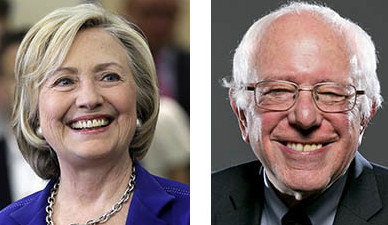The five Democrats running for president will debate Tuesday night in Las Vegas, a much-anticipated showdown in which someone not onstage – Vice President Joe Biden – will continue to loom over the proceedings as he considers whether to join the race.
People close to Biden insist that no decision on a presidential run will come before Tuesday night, but a broad expectation is that we are nearing the conclusion of a months-long public conversation about whether he will throw his hat in the ring.
Although Biden’s presence, and speculation about what might ensue if he joins the race, will be a hot topic of conversation, plenty onstage should keep you entertained.
Here’s my handicapping of what to expect from the four men and one woman onstage Tuesday night.
Hillary Rodham Clinton: People forget that of the 203 debates – that’s a rough estimate – in the 2008 Democratic primaries, Clinton won 80 percent of them. She’s a far more tested debater than anyone else who will be on the stage Tuesday and has faced far tougher circumstances than this; in 2008, she went against Barack Obama, John Edwards (who made his fortune as a trial lawyer), and the likes of Biden and Chris Dodd – who knew something about debating, given their time in the Senate.
Clinton has considerable command of the issues and thinks well on her feet. Her relentless commitment to being on message serves her well in debates. She’s an able counter-puncher when she needs to be.
The important question in this debate is one that is out of her hands. How hard do any of her opponents go after her, and on what? Does the controversy over her e-mail server come up? If so, who does the attacking, and how negative (if at all) does Clinton go in return?
Bernie Sanders: This debate has almost nothing but an upside for the Vermont socialist. His supporters will drink up his authenticity and willingness to say things that the others – most notably, Clinton – won’t. For Democrats who might not know Sanders yet, his strict adherence to liberal principles will appeal.
Sanders would be well served to push his differences with Clinton – his early opposition to the Trans-Pacific Partnership, for instance – in front of what will be the largest audience of the campaign to date. But his stated unwillingness to attack may preclude a true hit on her. That would be a mistake.
Martin O’Malley: No one knows who the former Maryland governor is, so simply being onstage with Clinton and Sanders is a very good thing for his presidential campaign.
Beyond benefiting from the “Oh, he’s that guy” phenomenon, O’Malley needs a moment (or three) that allows him to stand out to voters – and to the people (like me) who watch this stuff obsessively.
O’Malley is well aware of his need to break out – and that makes him the most interesting and unpredictable force in this debate. He will almost certainly go after Clinton as overly political and cautious to draw a contrast with what he will deem his principled liberal leadership during his eight years as the governor of Maryland.
But will he take on Clinton’s email server and the questions of whether she is honest and trustworthy enough to be the party’s nominee? Attacking Clinton in a debate setting isn’t as easy as it might look since – as I mentioned above – she is an able debater and will, no doubt, be ready for it.
For O’Malley, though, the reward is probably worth the risk. If he doesn’t start moving soon, he never will.
Jim Webb: The former one-term senator from Virginia is an acerbic personality who doesn’t back down – ever. Couple that with the fact that he has nothing to lose, and it’s possible that Webb stirs things up by going after Clinton or Sanders.
On what? That’s harder to know, because why Webb is running – and on what issues – has been remarkably hard to figure out. My guess is that he tries to make his mark on issues of foreign policy and national security, given his background as secretary of the Navy and his service as a Marine in Vietnam.
That might well mean that he and Clinton come into conflict over Syria, Iran and, maybe, the initial decision to go into Iraq, which Webb opposed and Clinton supported.
Lincoln Chafee: Chafee is, if possible, even less well known among Democrats – and the general public – than Webb. (And, trust me, that is no easy task.)
Stylistically, Chafee will have a hard time standing out – or being noticed at all – as he is unassuming and soft-spoken. He will benefit from the fact that only four other people will be onstage, meaning that by default, he will get a decent amount of speaking time.
Expect Chafee to focus on the fact that he was the lone Republican in the Senate to vote against authorizing the use of military force against Iraq (Clinton voted for it) and to talk about why he left the Republican Party.
Send questions/comments to the editors.



Success. Please wait for the page to reload. If the page does not reload within 5 seconds, please refresh the page.
Enter your email and password to access comments.
Hi, to comment on stories you must . This profile is in addition to your subscription and website login.
Already have a commenting profile? .
Invalid username/password.
Please check your email to confirm and complete your registration.
Only subscribers are eligible to post comments. Please subscribe or login first for digital access. Here’s why.
Use the form below to reset your password. When you've submitted your account email, we will send an email with a reset code.